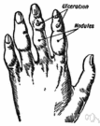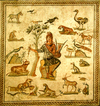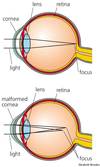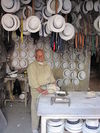My Cards Flashcards
(2048 cards)
deciduous
(dĭ-sĭj′o͞o-əs)
adj.
- Shedding or losing foliage at the end of the growing season: deciduous trees.
- Falling off or shed at a specific season or stage of growth: deciduous antlers; deciduous leaves.
- Of or relating to the primary teeth.
[From Latin dēciduus, from dēcidere, to fall off : dē-, de- + cadere, to fall; see kad- in Indo-European roots.]
de·cid′u·ous·ly adv.
de·cid′u·ous·ness n.

silica
(sĭl′ĭ-kə)
n. A white or colorless crystalline compound, SiO2, occurring abundantly as quartz, sand, flint, agate, and many other minerals and used to manufacture a wide variety of materials, especially glass and concrete.
[New Latin, from Latin silex, silic-, hard stone, flint.]

Molly Bloom
Molly Bloom is a fictional character in the novel Ulysses by James Joyce. The wife of main character Leopold Bloom, she roughly corresponds to Penelope in the Odyssey. The major difference between Molly and Penelope is that while Penelope is eternally faithful, Molly is not. Molly is having an affair with Hugh ‘Blazes’ Boylan after ten years of her celibacy within the marriage. Molly, whose given name is Marion, was born in Gibraltar in 1870, the daughter of Major Tweedy, an Irish military officer, and Lunita Laredo, a Gibraltarian of Spanish Jewish descent. Molly and Leopold were married in 1888. She is the mother of Milly Bloom, who, at the age of 15, has left home to study photography. She is also the mother of Rudy Bloom, who died at the age of 11 days. In Dublin, Molly is an opera singer of some renown.
The final chapter of Ulysses, often called “Molly Bloom’s Soliloquy”, is a long and unpunctuated stream of consciousness passage comprising her thoughts as she lies in bed next to Bloom.

bracken
n.
- A fern (Pteridium aquilinum) found worldwide, with large, triangular fronds usually divided into three parts.
- An area with dense thickets of this fern.

welter / weltering
n.
- A confused mass; a jumble: a welter of papers and magazines.
- Confusion; turmoil.
intr. v. wel·tered, wel·ter·ing, wel·ters
1. To wallow, roll, or toss about, as in mud or high seas.
2. To lie soaked in a liquid.
3. To roll and surge, as the sea.
[From Middle English welteren, to toss about, as in high seas, from Middle Low German or Middle Dutch, to roll; see wel- in Indo-European roots.]

barbiturate
(bär-bĭch′ər-ĭt, -ə-rāt′, bär-bĭch′ə-wĭt)
n. Any of a group of barbituric acid derivatives that act as central nervous system depressants and are used as sedatives or hypnotics.
transmogrify
(trăns-mŏg′rə-fī′, trănz-)
v. trans·mog·ri·fied, trans·mog·ri·fy·ing, trans·mog·ri·fies
v.tr.
To change thoroughly, as into a different shape or form. See Synonyms at convert.
v. To be thoroughly changed: “He couldn’t figure out why his simple desires for competence and order so often seemed to transmogrify into anger”
trans·mog′ri·fi·ca′tion (-fĭ-kā′shən) n.
pupa
(pyo͞o′pə)
n. pl. pu·pae (-pē) or pu·pas
An insect in the nonfeeding stage between the larva and adult, during which it typically undergoes complete transformation within aprotective cocoon or hardened case. Only insects that undergo complete metamorphosis have pupal stages.

gunmetal
n.
- An alloy of copper with 10 percent tin.
- Metal used for guns.
- A dark gray.
gun′met′al adj.

sarcophagus
n. pl. sar·coph·a·gi (-jī′) or sar·coph·a·gus·es
A stone coffin, often inscribed or decorated with sculpture.
[Latin, from Greek sarkophagos, coffin, from (lithos) sarkophagos, limestone that consumed the flesh of corpses laid in it : sarx, sark-, flesh + -phagos, -phagous.]
Word History: Sarcophagus, our term for a stone coffin located above ground, has a macabre origin befitting a macabre thing. Its ultimate source is the Greek word sarkophagos, “eating flesh, carnivorous,” a compound derived from sarx, “flesh,” and phagein, “to eat.” Sarkophagos was also used in the phrase lithos (“stone”) sarkophagos to denote a kind of limestone with caustic properties from which coffins were made in the ancient world. The Roman natural historian Pliny the Elder says that this stone was quarried near the town of Assos in the Troad and describes its remarkable properties as follows: “It is well known that the bodies of the dead placed in it will be completely consumed after forty days, except for the teeth.” The Greek term sarkophagos could also be used by itself as a noun to mean simply “coffin.” Greek sarkophagos was borrowed into Latin as sarcophagus and used in the phrase lapis (“stone”) sarcophagus to refer to the same stone as in Greek. In Latin, too, sarcophagus came to be used as a noun meaning “coffin made of any material.” The first known attestation of the word sarcophagus in English dates from 1601 and occurs in a translation of Pliny’s description of the stone. Later, sarcophagus begins to be used in English with the meaning “stone coffin,” especially in descriptions of sarcophagi from antiquity.

concertina
n. A small instrument with bellows like an accordion but with buttons in place of keys.
[concert + Italian -ina, feminine diminutive suff.]

evince
(ĭ-vĭns′)
tr.v. e·vinced, e·vinc·ing, e·vinc·es
To show or demonstrate clearly; manifest: evince distaste by grimacing.
martinet
(mär′tn-ĕt′)
n.
- A rigid military disciplinarian.
- One who demands absolute adherence to forms and rules.

tortuous
(tôr′cho͞o-əs)
adj.
- Having or marked by repeated turns or bends; winding or twisting: a tortuous road through the mountains.
- Not straightforward; circuitous; devious: a tortuous plot; tortuous reasoning.
- Highly involved; complex: tortuous legal procedures.
[Middle English, from Anglo-Norman, from Latin tortuōsus, from tortus, a twisting, from past participle of torquēre, to twist; see terkw- in Indo-European roots.]
tor′tu·ous·ly adv.
tor′tu·ous·ness n.
Usage Note: Although tortuous and torturous both come from the Latin word torquēre, “to twist,” their primary meanings are distinct. Tortuous means “twisting” (a tortuous road) or by extension “complex” or “devious.” Torturous refers primarily to torture and the pain associated with it. However, torturous also can be used in the sense of “twisted, strained, belabored” and tortured is an even stronger synonym: a tortured analogy.

bivouac
(bĭv′o͞o-ăk′, bĭv′wăk′)
n. , v. -acked, -ack•ing. n.
1. a military encampment made with tents.
2. the place used for such an encampment.
3. to assemble in a bivouac.

oncology
n.
The branch of medicine that deals with tumors, including study of their development, diagnosis, treatment, and prevention.
[Greek onkos, mass, tumor; see nek- in Indo-European roots + -logy.]
on′co·log′i·cal (-kə-lŏj′ĭ-kəl), on′co·log′ic (-lŏj′ĭk) adj.
on·col′o·gist n.
Choronzon
Choronzon /ˌkoʊˌroʊnˈzoʊn/ is a demon or devil that originated in writing with the 16th century occultists Edward Kelley and John Dee within the latter’s occult system of Enochian magic. In the 20th century he became an important element within the mystical system of Thelema, founded by Aleister Crowley, where he is the Dweller in the Abyss, believed to be the last great obstacle between the adept and enlightenment. Thelemites believe that if he is met with proper preparation, then his function is to destroy the ego, which allows the adept to move beyond the Abyss of occult cosmology.

portico
(pôr′tĭ-kō′)
n. pl. por·ti·coes or por·ti·cos
A porch or walkway with a roof supported by columns, often leading to the entrance of a building.
[Italian, from Latin porticus, from porta, gate; see per- in Indo-European roots.]
por′ti·coed′ adj.

Size of the Milky Way
Think the Milky Way is big? It’s puny compared to M87, an elliptical galaxy 980,000 light years in diameter. The Milky Way is only 100,000 light years in diameter.
Mary Tudor
Daughter of Henry VIII and Catherine of Aragon who was Queen of England from 1553 to 1558; she was the wife of Philip II of Spain and when she restored Roman Catholicism to England many Protestants were burned at the stake as heretics (1516-1558)
Also: Bloody Mary, Mary I
abatis
(ăb′ə-tē′, -tĭs)
n. pl. ab·a·tis (-tēz′) or ab·a·tis·es (-tĭ-sĭz)
A defensive obstacle made by laying felled trees on top of each other with branches, sometimes sharpened, facing the enemy.
[French, pile of things thrown down, from Old French abateis; akin to abattre, to throw down; see abate.]

Pan / Faunus
In Greek religion and mythology, Pan is the god of the wild, shepherds and flocks, nature of mountain wilds and rustic music, and companion of the nymphs. He has the hindquarters, legs, and horns of a goat, in the same manner as a faun or satyr. With his homeland in rustic Arcadia, he is also recognized as the god of fields, groves, and wooded glens; because of this, Pan is connected to fertility and the season of spring. The ancient Greeks also considered Pan to be the god of theatrical criticism.
In Roman religion and myth, Pan’s counterpart was Faunus, a nature god who was the father of Bona Dea, sometimes identified as Fauna; he was also closely associated with Sylvanus, due to their similar relationships with woodlands. In the 18th and 19th centuries, Pan became a significant figure in the Romantic movement of western Europe and also in the 20th-century Neopagan movement.

fulminate
(fo͝ol′mə-nāt′, fŭl′-)
v. ful·mi·nat·ed, ful·mi·nat·ing, ful·mi·nates
v. intr.
1. To issue a thunderous verbal attack or denunciation: fulminated against political chicanery.
2. To explode or detonate.
v.tr. 1.
To issue (a denunciation, for example) thunderously.
2. To cause to explode. n. An explosive salt of fulminic acid, especially fulminate of mercury.
ful′mi·na′tion n.
ful′mi·na′tor n.
ful′mi·na·to′ry (-nə-tôr′ē) adj.
elocution
(ĕl′ə-kyo͞o′shən)
n.
- The art of public speaking in which gesture, vocal production, and delivery are emphasized.
- A style or manner of speaking, especially in public.
[Middle English elocucioun, from Latin ēlocūtiō, ēlocūtiōn-, from ēlocūtus, past participle of ēloquī, to speak out : ē-, ex-, ex- + loquī, to speak; see tolkw- in Indo-European roots.]
el′o·cu′tion·ar′y (-shə-nĕr′ē) adj.
el′o·cu′tion·ist n.

































































































































































































































































































































































































































































































































































































































































































































































































































































































































































































































































































































